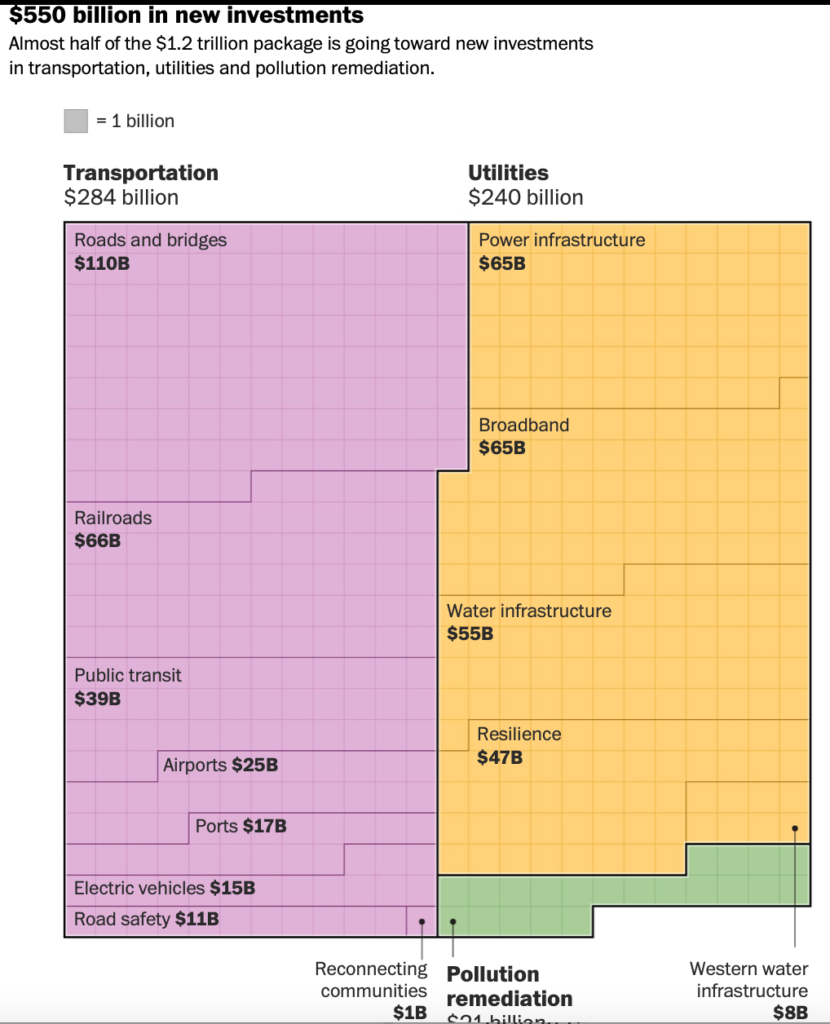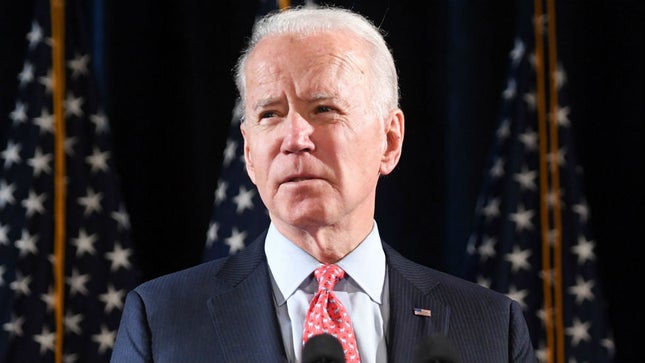I get that Philip Klein of the National Review is disappointed that Speaker Nancy Pelosi was able to pass the Bipartisan Infrastructure Bill on Saturday with the help of Republican votes. He wanted President Biden’s whole agenda to crash and burn. But one point that Klein makes can’t go unchallenged.
The strategy all along was for Democrats to win over some Republicans to their cause by creating a charade that their agenda was actually divided into two parts: a physical infrastructure bill, and a sweeping social-welfare bill.
For months, Democrats have been battling amongst themselves, with some members more attached to the infrastructure bill and others more attached to the social-welfare bill. But ultimately, time and again, it has become clear that the two bills were inextricably linked, and would rise and fall together.
Senate Republicans got the ball rolling when 18 of them decided support the unnecessary infrastructure bill, with its $550 billion in new spending, and send it to the House for final passage.
My problem here is Klein’s insistence that the physical infrastructure bill is “unnecessary.”
I understand that different people have different priorities. Conservatives aren’t convinced that it’s “necessary” to give people “social” infrastructure in the form of paid leave or assistance with day care. They don’t think there’s a need to lower the price of insulin or other life-saving drugs. While liberals disagree, I can see where there’s at least a legitimate debate about the urgency of these investments.
But I don’t think there’s a legitimate debate about the need for physical infrastructure spending. Maybe the most potent argument in favor of my point is that in May 2020, President Trump requested $2 trillion in infrastructure spending as part of his COVID-19 relief package.
Four days after signing an unprecedented $2 trillion relief bill to blunt the economic damage from the coronavirus pandemic, the president on Tuesday called for the U.S. to spend another couple trillion bucks on a massive infrastructure package. In a tweet, he wrote that “this is the time” to craft an infrastructure overhaul with U.S. interest rates at zero during the crisis.
“It should be VERY BIG & BOLD, Two Trillion Dollars, and be focused solely on jobs and rebuilding the once great infrastructure of our Country! Phase 4,” the president said, referencing the three pieces of emergency legislation lawmakers have already passed to combat the outbreak rampaging across the U.S.
Of course, eleven months later, in April 2021, Trump heavily criticized the nascent form of the bill that passed last night, even though it was half the size of the bill he’d called for in 2020. But even then he didn’t say it was unnecessary. He said the Republicans should negotiate a better deal.
“Joe Biden’s infrastructure bill is a disgrace,” Trump said in his opening message. “If Mitch McConnell was smart, which we’ve seen no evidence of, he would use the debt ceiling card to negotiate a good infrastructure package.”
Trump, who was unable to secure a infrastructure package while in office, said that lawmakers didn’t have enough time to fully read the legislation.
“This is a 2,700 page bill that no one could have possibly read — they would have needed to take speed reading courses,” he said. “It is a gift to the Democrat Party, compliments of Mitch McConnell and some RINOs, who have no idea what they are doing.”
This is pretty clearly an example of Trump supporting something when he’d get credit for it and opposing it when he wouldn’t. The truth is, the need for investment in infrastructure is real and doesn’t depend on political authorship. The Council on Foreign Relations produced a report in August on the state of American infrastructure, and the findings were unambiguous. Nearly a quarter of our bridges are either structurally deficient or functionally obsolete, our airports suffer from severe flight delays, we need hundreds of billions of dollars in water investment, our ports are inefficient, and our electrical grid is old and unreliable.
The $20 trillion U.S. economy relies on a vast network of infrastructure from roads and bridges to freight rail and ports to electrical grids and internet provision. But the systems currently in place were built decades ago, and economists say that delays and rising maintenance costs are holding economic performance back. Civil engineers raise safety concerns as well, warning that many bridges are structurally deficient and that antiquated drinking water and wastewater systems pose risks to public health. Meanwhile, Americans’ international peers enjoy more efficient and reliable services, and the U.S. lags behind other developed countries in infrastructure spending.
When we look at what is contained in the $1.2 trillion bipartisan infrastructure bill, we see that it addresses these needs.

The clear need for physical infrastructure investment is precisely why the bill attracted Republican votes in both the House and the Senate. The only substantive debate is over how much to invest in each area of need, and how to pay for it.
And that’s the problem with Klein’s temper tantrum.
Every Republican who voted for this monstrosity who is not already retiring should be primaried and defeated by candidates who will actually resist the Left-wing agenda. Those who are retiring should be shamed for the rest of their lives. It also is not too soon to be asking whether Representative Kevin McCarthy should be ousted from leadership for his inability to keep his caucus together on such a crucial vote.
Insofar as Klein has a leg to stand on, it’s his recognition that by helping the Democrats pass the physical infrastructure bill, they’ve also helped their prospects of passing the Biden administration’s Build Back Better social infrastructure bill. But Biden could have put both bills together from the start and pushed it all through the budget reconciliation process that only requires 50 Senate votes to pass. He split them in half instead so Republicans could have a say in how the physical infrastructure spending is allocated. Liberals weren’t thrilled with this idea because it meant making compromises, but the cost for having a say for Republicans is actually supporting the bill when it comes to a vote. Enough of them did that in both the Senate and the House to create a much needed piece of bipartisan legislation.
Trump should have been able to accomplish the same thing, but he didn’t know how, and he didn’t even try. He proposed $2 trillion in spending, but his own party rejected him outright, even though it was an election year and he was struggling with bad poll numbers. He didn’t have the skills or relationships with the Democrats to pull votes from their side, so he was left empty handed.
Biden promised he could get it done, and he delivered. Maybe that annoys Klein, but it’s not a reason to primary Republican lawmakers.




Boy does Klein look like a sore loser!!!! He even had to say this will generate a $250B deficit and the dems are about to take over preschool. Wow awesome eh?
It was so nice to see this happen and that 13 House Republicans supported it. Contrary to Klein I think this was much needed but then I am not an engineer. We likely need another trillion.
Now I have my fingers crossed for the next piece. Wouldn’t it be just great if a republican or two supported it in the senate?
I wouldn’t hold out much hope for any GOP Senator supporting the social infrastructure bill once it is ready to be sent to the Senate, but I agree it would be swell. That might either give one of the Dem holdouts an out to “vote their conscience” or better yet, give those holdouts an opening to say that this really is a middle-of-the-road piece of legislation. As long is it passes, I’ll be fine, regardless. What got passed Thursday night was a much needed boost for all of us. It is, as Biden would say, a Big Deal. Now I just hope Dems can figure out how to come up with a simple message to sum up just how big a deal this is. As someone surrounded by rural areas within 15 minutes – 25 minutes, depending in which direction I drive, I can tell you that getting broadband into our rural areas will be a game changer. It will make it easier for my workplace to retain students who are at a real disadvantage compared to those who live in one of the larger cities in the area. A boost in blue collar jobs is very much needed, and worth celebrating. A lot of these folks probably still won’t vote for our candidates, but at least they’ll get reminded, I hope, often that they are not being left behind and forgotten.